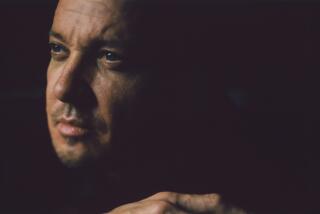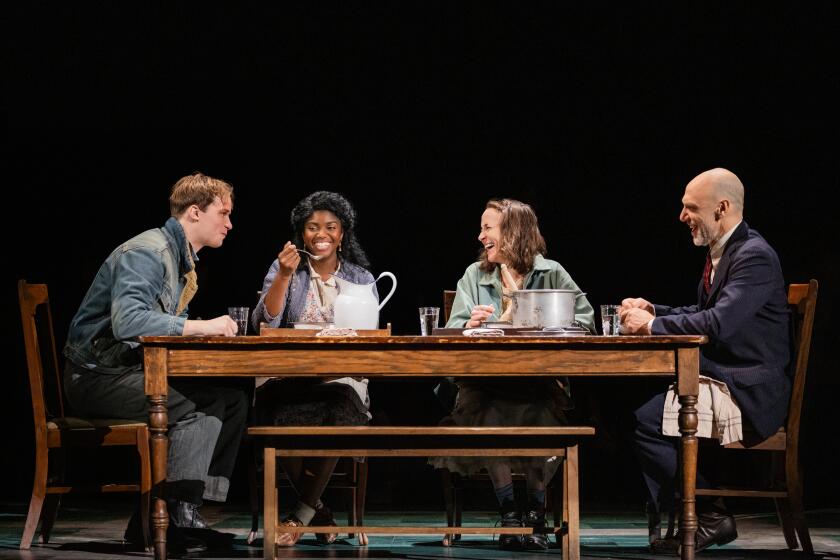WEST COAST PREMIERE OF ‘EVERY GOOD BOY’ : TWO VIEWS OF STOPPARD-PREVIN’S PIECE FOR ACTORS AND ORCHESTRA
In their attempt to pour new wine into old bottles, Tom Stoppard and Andre Previn have created a work that entertains at the same time it delivers messages.
At the West Coast premiere of their collaborative effort called “Every Good Boy Deserves Favour,” described as “a piece for actors and orchestra,” the audience in the Dorothy Chandler Pavilion cheered long and cordially Thursday night. If the publicity is to be believed, the work has everywhere met with the same response on its steady course around the world.
The wine has substance and a certain new flavor; the bottle in which it is served has modern trimmings but is basically one of the oldest of musical forms. The combination of the spoken voice with instrumental music seems to have originated with Jean-Jacques Rousseau in his “Pygmalion” of 1770. Beethoven developed the idea in the dungeon scene of “Fidelio,” and Weber further exploited it in the Wolf’s Glen scene from “Der Freischuetz.”
Berlioz may have been the first, in “Lelio,” to use melodrama in a large symphonic work, but almost every prominent 19th-Century composer ventured his own type of melodrama. In the 20th Century, it culminated in the Sprechgesang of Schoenberg in “Pierrot Lunaire,” “Moses und Aron” and “A Survivor From Warsaw.”
Stoppard and Previn, therefore, have forged no new channels in “Every Good Boy Deserves Favour.” It may be the first time that an entire symphony orchestra has been depicted as a character in a drama, and incorporated into it. But it is conceivable that Stoppard’s arresting sketch might successfully be performed with only an orchestra of the imagination, as it is heard by the lunatic character in the play.
The authors have not really attempted to combine speech and music. The orchestra never plays during the speaking. When the orchestra is heard by itself, it clearly is setting a mood or making a musical statement of the dramatic action. The dramatist’s requests for music in his script are judicious, and Previn has been careful not to overstate the case for music.
What Previn has written is, in effect, a kind of film music. It is never obtrusive and it is always cautiously tailored to the theatrical moment. And, naturally, it is expertly composed and deftly orchestrated. It holds the attention without being too aggressive or too insistent, or the reverse of those things.
Most of the music appears in short episodes or in interludes slightly more amplified in breadth and length. Plainly, the score has not been composed with a thought of excerpting. We are not about to be faced with a deluge of symphonic suites from “Every Good Boy.”
To paint in the Soviet background of the tale, Previn deliberately has imitated some of the parodistic aspects of the styles of Shostakovich and Prokofiev, though he never quotes literally. There is a bit of irony to this, seeing that Shostakovich and Prokofiev both suffered as much from Soviet oppression as does Stoppard’s eloquent dissenter.
The only actual quotations in the score are the final measures from Tchaikovsky’s “1812” Overture, appropriately underscoring a reading of passages from Tolstoy’s “War and Peace.” Previn’s effects are well-contrived; probably the best of them is the simplest: the voice of the boy Sacha singing an inane little tune almost unaccompanied while his father’s fate as a defier of Soviet intolerance is being settled. Alban Berg uses the same effect to equal purpose in the closing scene of “Wozzeck.” Berg got there first with it.
Perhaps the title “Every Good Boy Deserves Favour” requires a line of explanation for non-musicians. The first letter of each word names the five lines of the treble clef. As a musical motif, E-G-B-D-F occurs, spelled out, toward the beginning of the score, and rather pointedly stressed near the end.
The musical aspects of the production were on the same level of intensity as the rest of Gordon Davidson’s resourceful staging. Previn conducted as modestly and inconspicuously as if he were only another musician in the ensemble, and the Los Angeles Philharmonic played with unflagging care and devotion.
More to Read
The biggest entertainment stories
Get our big stories about Hollywood, film, television, music, arts, culture and more right in your inbox as soon as they publish.
You may occasionally receive promotional content from the Los Angeles Times.






